初中英语语法三大从句总结,建议收藏!
初中英语语法三大基本从句归纳
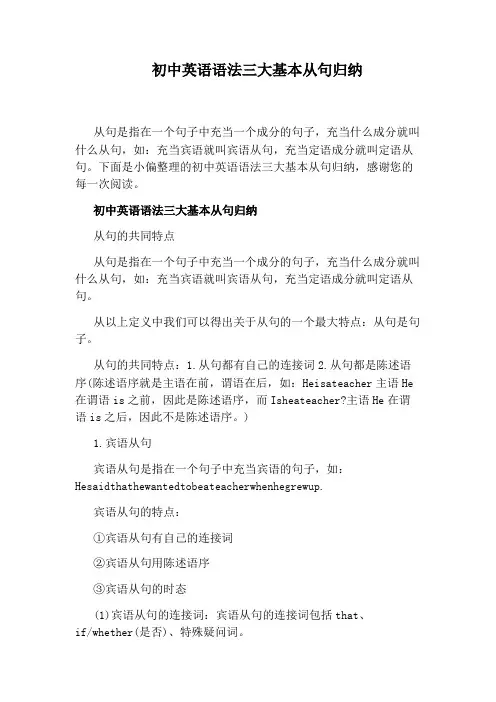
初中英语语法三大基本从句归纳从句是指在一个句子中充当一个成分的句子,充当什么成分就叫什么从句,如:充当宾语就叫宾语从句,充当定语成分就叫定语从句。
下面是小偏整理的初中英语语法三大基本从句归纳,感谢您的每一次阅读。
初中英语语法三大基本从句归纳从句的共同特点从句是指在一个句子中充当一个成分的句子,充当什么成分就叫什么从句,如:充当宾语就叫宾语从句,充当定语成分就叫定语从句。
从以上定义中我们可以得出关于从句的一个最大特点:从句是句子。
从句的共同特点:1.从句都有自己的连接词2.从句都是陈述语序(陈述语序就是主语在前,谓语在后,如:Heisateacher主语He 在谓语is之前,因此是陈述语序,而Isheateacher?主语He在谓语is之后,因此不是陈述语序。
)1.宾语从句宾语从句是指在一个句子中充当宾语的句子,如:Hesaidthathewantedtobeateacherwhenhegrewup.宾语从句的特点:①宾语从句有自己的连接词②宾语从句用陈述语序③宾语从句的时态(1)宾语从句的连接词:宾语从句的连接词包括that、if/whether(是否)、特殊疑问词。
(2)宾语从句的语序:A.宾语从句的连接词后加陈述语序(主语在前,谓语在后),如:IwanttoknowifhecancometomorrowB.当连接词本身又是宾语从句的主语时,后面直接加谓语动词,如:Sheaskedmewhohadhelpedhim.(3)宾语从句的时态,只要记住以下口诀就可以了“主现则从任,主过则从过,客观真理一般现”A.主现则从任:主句如果是一般现在时,则从句根据时间状语需要从八种时态中任选一种,如:1.HetellsmehelikesEnglishverymuch(一般现在时)B.主过则从过:主句如果是一般过去时,则从句根据时间状语需要从四种带“过”字的时态中任选一种,带“过”字的时态分别是如:一般过去时,过去进行时,过去将来时,过去完成时。
初中英语语法——三大从句汇总(重点笔记)
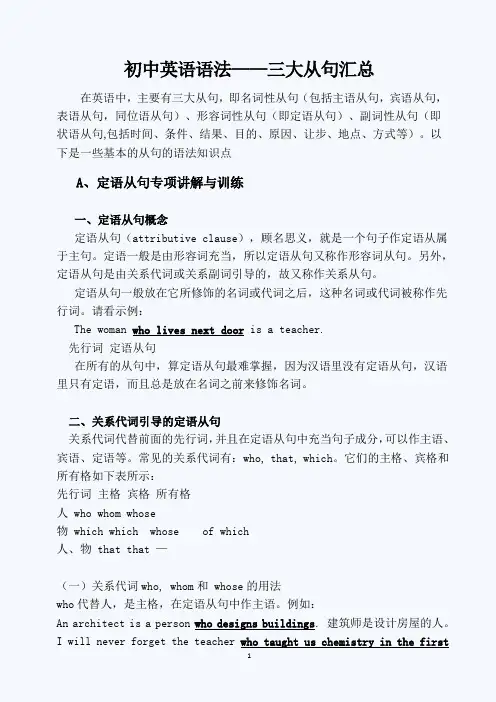
初中英语语法——三大从句汇总在英语中,主要有三大从句,即名词性从句(包括主语从句,宾语从句,表语从句,同位语从句)、形容词性从句(即定语从句)、副词性从句(即状语从句,包括时间、条件、结果、目的、原因、让步、地点、方式等)。
以下是一些基本的从句的语法知识点A、定语从句专项讲解与训练一、定语从句概念定语从句(attributive clause),顾名思义,就是一个句子作定语从属于主句。
定语一般是由形容词充当,所以定语从句又称作形容词从句。
另外,定语从句是由关系代词或关系副词引导的,故又称作关系从句。
定语从句一般放在它所修饰的名词或代词之后,这种名词或代词被称作先行词。
请看示例:The woman who lives next door is a teacher.先行词定语从句在所有的从句中,算定语从句最难掌握,因为汉语里没有定语从句,汉语里只有定语,而且总是放在名词之前来修饰名词。
二、关系代词引导的定语从句关系代词代替前面的先行词,并且在定语从句中充当句子成分,可以作主语、宾语、定语等。
常见的关系代词有:who, that, which。
它们的主格、宾格和所有格如下表所示:先行词主格宾格所有格人 who whom whose物 which which whose of which人、物 that that —(一)关系代词who, whom和 whose的用法who代替人,是主格,在定语从句中作主语。
例如:An architect is a person who designs buildings. 建筑师是设计房屋的人。
I will never forget the teacher who taught us chemistry in the firstyear of my senior middle school.我将永远不会忘记在高一时教我们化学的那位老师。
Anyone who wants to apply for this job must send us the resume by email first. 想应聘这个职位的任何人都必须先通过电子邮件向我们发送简历。
初中英语语法三大从句总结,仅此一份,建议收藏!
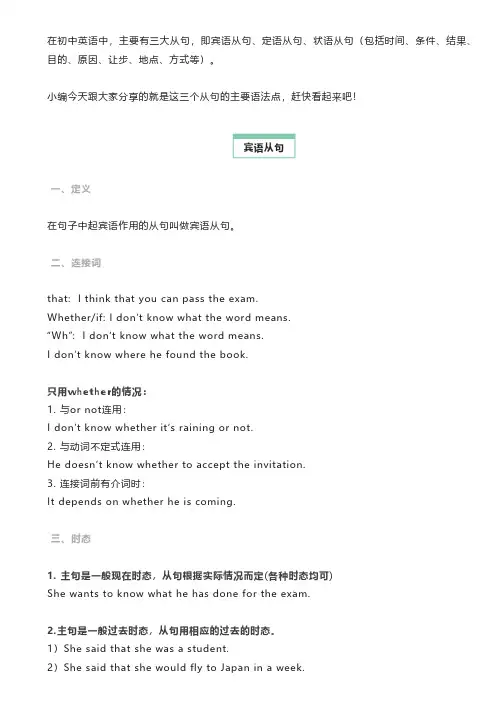
在初中英语中,主要有三大从句,即宾语从句、定语从句、状语从句(包括时间、条件、结果、目的、原因、让步、地点、方式等)。
小编今天跟大家分享的就是这三个从句的主要语法点,赶快看起来吧!宾语从句一、定义在句子中起宾语作用的从句叫做宾语从句。
二、连接词that: I think that you can pass the exam.Whether/if: I don’t know what the word means.“Wh”: I don’t know what the word means.I don’t know where he found the book.只用whether的情况:1. 与or not连用:I don’t know whether it’s raining or not.2. 与动词不定式连用:He doesn’t know whether to accept the invitation.3. 连接词前有介词时:It depends on whether he is coming.三、时态1. 主句是一般现在时态,从句根据实际情况而定(各种时态均可)She wants to know what he has done for the exam.2.主句是一般过去时态,从句用相应的过去的时态。
1)She said that she was a student.2)She said that she would fly to Japan in a week.3)She said that she had finished her homework already.3. 如果宾语从句说的是客观真理、自然现象或事实时,这时宾语从句要用一般现在时态。
The teacher said that the earth goes round the sun.一、定义在复合句中修饰名词、代词的从句叫定语从句。
三大从句知识点
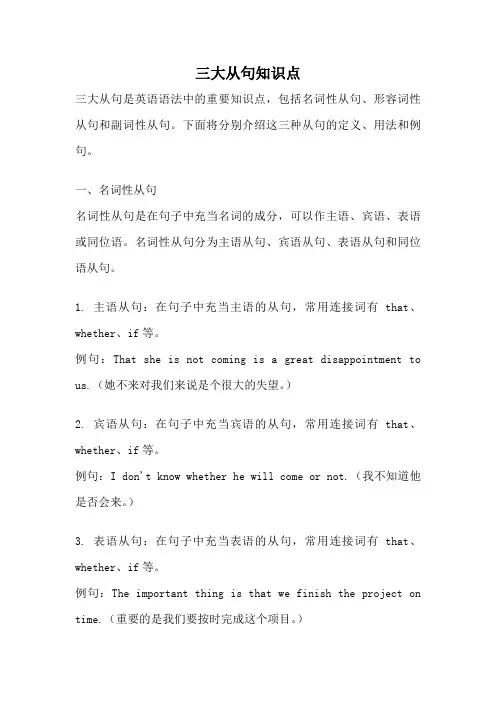
三大从句知识点三大从句是英语语法中的重要知识点,包括名词性从句、形容词性从句和副词性从句。
下面将分别介绍这三种从句的定义、用法和例句。
一、名词性从句名词性从句是在句子中充当名词的成分,可以作主语、宾语、表语或同位语。
名词性从句分为主语从句、宾语从句、表语从句和同位语从句。
1. 主语从句:在句子中充当主语的从句,常用连接词有that、whether、if等。
例句:That she is not coming is a great disappointment to us.(她不来对我们来说是个很大的失望。
)2. 宾语从句:在句子中充当宾语的从句,常用连接词有that、whether、if等。
例句:I don't know whether he will come or not.(我不知道他是否会来。
)3. 表语从句:在句子中充当表语的从句,常用连接词有that、whether、if等。
例句:The important thing is that we finish the project on time.(重要的是我们要按时完成这个项目。
)4. 同位语从句:用来解释或说明名词或代词的从句,常用连接词有that、whether、if等。
例句:The fact that he lied surprised everyone.(他撒谎的事实让每个人都感到惊讶。
)二、形容词性从句形容词性从句是用来修饰名词或代词的从句,常用连接词有who、whom、whose、which、that等。
5. 限制性形容词性从句:对名词或代词进行限制或修饰,不能省略。
例句:The book that I borrowed from the library is very interesting.(我从图书馆借来的那本书非常有趣。
)6. 非限制性形容词性从句:对名词或代词进行补充说明,用逗号与主句隔开,可以省略。
例句:My sister, who is a doctor, lives in London.(我的妹妹是个医生,住在伦敦。
初中英语语法-英语从句总结
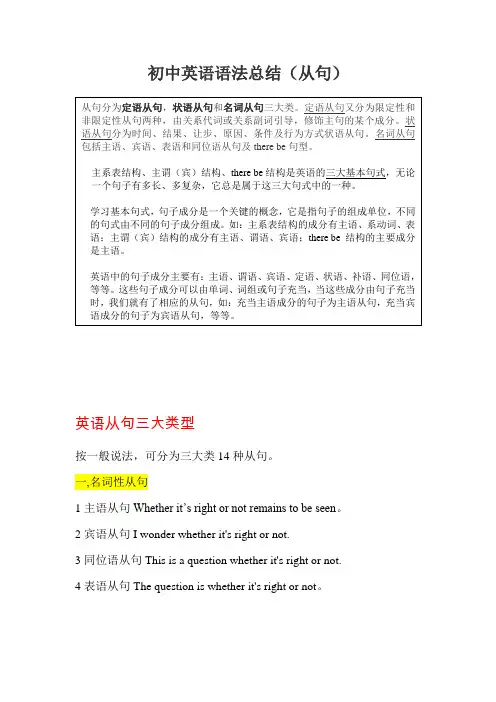
初中英语语法总结(从句)英语从句三大类型按一般说法,可分为三大类14种从句。
一,名词性从句1主语从句Whether it’s right or not remains to be seen。
2宾语从句I wonder whether it's right or not.3同位语从句This is a question whether it's right or not. 4表语从句The question is whether it's right or not。
二,定语从句1限定性定语从句She is the student who can speak English well。
2非限定性定语从句She is the student, who can speak English well。
三,状语从句1时间状语从句The fact will come out when he comes here。
2地点状语从句You can go wherever you like。
3原因状语从句Pay more attention to your lessons because you are astudent。
4方式状语从句He walks as if he were a king.5目的状语从句She went to Japan so that she could learn Japanese well. 6结果状语从句She went to Japan so that she learned Japanese well.7条件状语从句I will understand it if he tells me.8让步状语从句He knows a lot though he is little.1.定语从句There are some old books in the box.The boy dressed in blue is from America。
中考英语必考的3大从句
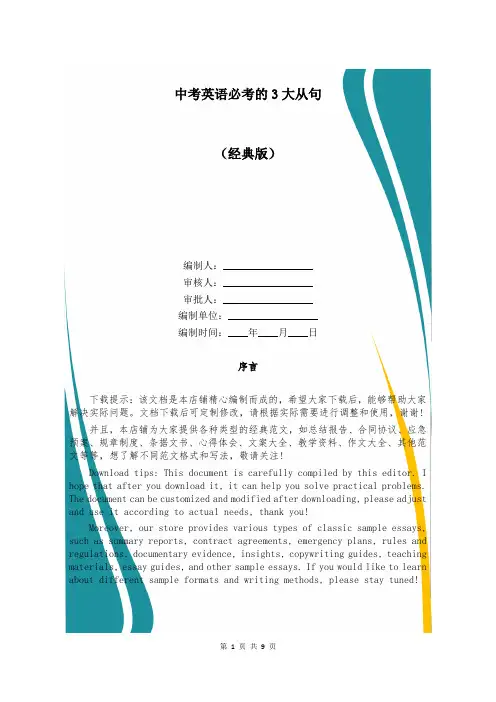
中考英语必考的3大从句(经典版)编制人:__________________审核人:__________________审批人:__________________编制单位:__________________编制时间:____年____月____日序言下载提示:该文档是本店铺精心编制而成的,希望大家下载后,能够帮助大家解决实际问题。
文档下载后可定制修改,请根据实际需要进行调整和使用,谢谢!并且,本店铺为大家提供各种类型的经典范文,如总结报告、合同协议、应急预案、规章制度、条据文书、心得体会、文案大全、教学资料、作文大全、其他范文等等,想了解不同范文格式和写法,敬请关注!Download tips: This document is carefully compiled by this editor. I hope that after you download it, it can help you solve practical problems. The document can be customized and modified after downloading, please adjust and use it according to actual needs, thank you!Moreover, our store provides various types of classic sample essays, such as summary reports, contract agreements, emergency plans, rules and regulations, documentary evidence, insights, copywriting guides, teaching materials, essay guides, and other sample essays. If you would like to learn about different sample formats and writing methods, please stay tuned!中考英语必考的3大从句中考英语必考的3大从句导语:宾语从句、状语从句和定语从句是初中阶段必须会学到的内容,从句对于同学们来说有一些难度,因为之前没有接触过这个名词。
英语从句知识点总结笔记
英语从句知识点总结笔记一、从句的分类英语中的从句主要包括名词性从句、形容词性从句和副词性从句三种。
1. 名词性从句名词性从句在句中的作用相当于名词,可做主语、宾语、表语或宾语补语。
名词性从句主要包括主语从句、宾语从句、表语从句和同位语从句等。
主语从句:引导词为that, whether, if, who, what, which, whoever, whatever, whichever等。
例如:What he said is true.(他说的话是真的。
)宾语从句:引导词为that, whether, if, who, whom, whose, what, which等。
例如:I know what you mean.(我知道你的意思。
)表语从句:引导词为that, whether, who, whom, whose, what, which等。
例如:The problem is whether we can solve it.(问题是我们能否解决它。
)同位语从句:引导词为that, whether, who, what, which等。
例如:The news that he won the championship pleased everyone.(他赢得了冠军的消息使每个人都很高兴。
)2. 形容词性从句形容词性从句相当于形容词,在句中修饰名词或代词。
形容词性从句的引导词有that, who, whom, whose, which等。
例如:The book that you are reading is interesting.(你正在读的那本书很有趣。
)3. 副词性从句副词性从句相当于副词,在句中修饰动词、形容词、副词等。
副词性从句分为时间状语从句、地点状语从句、原因状语从句、条件状语从句、目的状语从句、结果状语从句等类型。
时间状语从句:引导词有when, while, before, after, since, until, as soon as, whenever, the moment等。
英语三大从句语法讲解
英语三大从句在英语中,主要有三大从句,即名词性从句包括主语从句,宾语从句,表语从句,同位语从句、形容词性从句即定语从句、副词性从句即状语从句,包括时间、条件、结果、目的、原因、让步、地点、方式等;定语从句一、关系代词引导的定语从句关系代词代替前面的先行词,并且在定语从句中充当句子成分,可以作主语、宾语、定语等;常见的关系代词有:who, that, which;它们的主格、宾格和所有格如下表所示:一关系代词who, whom和 whose的用法who代替人,是主格,在定语从句中作主语;An architect is a person who designs buildings. 建筑师是设计房屋的人;whom代替人,是宾格,在定语从句作宾语,在非正式英语常可省略;Do you know the gentleman whom we met in the school library yesterday 昨天我们在学校图书馆里遇到的那位先生你认识吗whose一般代替人,有时亦可代替物,是所有格,在定语从句作定语; The girl student whose father is a senior engineer used to study abroad. 其父是一位高级工程师的那个女学生过去在国外留学;Do you know the name of the hotel whose window we can see here 我们这儿能看到窗户的那个宾馆叫什么名字,你知道吗关系代词whose指代先行词hotel,正式用法应该用of which;whose window=the window of which,意思是:the window of the hotel; 二关系代词which的用法which代替物,在定语从句作主语或宾语,作宾语时还可省略;I do not like stories which have unhappy endings.我不喜欢有不幸结局的小说;which可以换成that三关系代词that的用法that既可指人又可指物,在当代英语中大多指物,在定语从句作主语或宾语,作宾语时还可省略;:Is she the girl that sells newspapers她是卖报纸的那个女孩吗that可以换成whoWhere is the ice-cream that was in the fridge放在冰箱的冰激凌哪儿去了that可以换成whichIs this the book that you want to buy这是你要买的那本书吗 that可以换成which,在定语从句作宾语,还可以省略二、关系副词引导的定语从句常用的关系副词只有三个:when, where, why,在定语从句中充当时间、地点和原因状语;一关系副词when的用法关系副词when代替的先行词表示的是时间,when在定语从句作时间状语;In Beijing July and August are the months when it rains very often.北京的七月和八月是常下雨的月份;when先行词是months二关系副词where的用法关系副词where代替的先行词表示的是地点,where在定语从句作地点状语;During the Spring Festival I went back to the town where I was brought up.春节期间,我回到了生我养我的家乡;where的先行词是town三关系副词why的用法关系副词why代替的先行词表示的是原因,why在定语从句作原因状语;The reason why I am phoning you is to ask you whether you have got my email.我打电话给你的原因是想问问你是否收到了我的电子邮件;why先行词是reason, 当代英语里why可以用that替代,这时关系代词that 就变成了表示原因的关系副词,还可以将why省略三、特殊关系代词as引导的定语从句一在固定搭配as…as, so…as, such…as, the same…as中,as引导定语从句You may take as many books as you want.你想要拿多少书就拿多少;第一个as是副词,修饰many的;第二个as才是关系代词,代替先行词books,在定语从句中作宾语二独立于主句之外,as引导定语从句As we know/ As is known to us, the earth turns around the sun. 正如我们所知,地球围绕太阳旋转;As we know和 As is known to us均为定语从句,as分别作宾语和主语,替代后面的主句;Taiwan is, as you know, an inseparable part of China.你知道,台湾是中国不可分割的一部分;关系代词as指代整个主句,在定语从句中作宾语;四、关系代词who, which与that的区别一关系代词who与that的区别1. 当关系代词用作主语时,多用主格who;He who loses hope loses all.失去希望的人就失去一切;先行词为代词he, they, any, all, one 等时,多用whoI met Alice, who told me that she was learning Chinese.我遇见艾丽斯,她告诉我她在学汉语;在非限制性定语从句中,用who 2. 当关系代词用作介词后的宾语时,用宾格whom,不用that;The man to whom our headmaster talked just now is our English teacher.我们校长刚才与他谈话的那个人是我们的英语老师;介词与关系代词紧密相连时,只能用宾格whom,不可用主格who注意:介词与关系代词不是紧密相连时,或者说介词放在句子后面时,这时可以用主格who,也可用that,还可以省略关系代词;因此,上面的这句话还可以有如下四种说法:1 The man whom our headmaster talked to just now is our English teacher.2 The man who our headmaster talked to just now is our English teacher.3 The man that our headmaster talked to just now is our English teacher.4 The man our headmaster talked to just now is our English teacher.3. 当关系代词泛指人时,多用that;He is a man that is never afraid of failure.他是个从不怕失败的人;that用来泛指人4. 当关系代词出现在who开头的疑问句时,应用that;例如:Who is the girl that is talking to Tom in English用英语同汤姆交谈的那个女孩是谁避免重复使用who,以免造成误解或语义含混不清二关系代词which与that的区别1. 当先行词为all, much, little以及不定代词anything, something, everything等时,关系代词多用that;All that glitters is not gold. 闪闪发光物,未必尽黄金;She told me everything that she knew. 她把她所知道的一切都告诉了我;2. 当先行词的前面有形容词最高级、序数词或限定词the only, the very, all, every, any, no等时,关系代词一般都用that;This is the best novel that I have ever read. 这是我读过的最好的一部小说;He is the only person that has been invited to the ball. 他是惟一应邀参加舞会的人;3. 当关系代词出现在which开头的疑问句时,应用that;Which was the hotel that was recommended to the foreign guest 哪一个是推荐给外宾的宾馆这里使用that很明显是为了避免重复which4. 在非限制性定语从句中,关系代词一般只用which;Beijing, which is the capital of the People’s Republic of China, will host the 2008 Olympic Games. 北京是中华人民共和国的首都,将主办2008年奥运会;5. 介词后的关系代词用which,而不用that;She has collected 600 stamps, 60% of which are German stamps. 她收集了600张邮票,其中60%是德国邮票;五、定语从句的位置如前所述,定语从句一般总是直接置于所修饰的名词或代词之后;有时候,定语从句与先行词之间插入了其他的短语,这样它们被分隔了,这种情况下的定语从句被称作隔离定语从句;There was a girl upstairs who was shouting and crying, obviously mad.楼上有一个女孩,大喊大叫;很明显,她疯了;定语从句who was shouting and crying修饰the girl,被upstairs所隔开A new master will come tomorrow who will teach you German. 明天要来一位新老师教你们德语了;定语从句置于句末以示强调名词性从句宾语从句一、引导词1由that 引导的陈述句性的宾语从句,在很多动词如say, think, wish , hope, see, believe, agree, expect, hear , feel等动词后;连词that只起连接作用,在从句中不做句子的成分,也无词汇意义,在口语中常被省略;如:I told him that he was wrong.在think, believe, suppose, expect等动词引起的宾语从句中,有时谓语尽管是否定意义,却不用否定形式,而将think 等动词变为否定形式;见语法:否定转移如:I don’t think you are right. 我认为你做的不对在许多带有复合宾语的句子中,that引导的宾语从句经常移到句子的后面,而用it做形式宾语;We think it wrong that he told a lie to everyone 我认为他向每一个人撒谎是错误的2 由连词if、 whether 引导的表示“是否…”的宾语从句; Whether, if 在从句中不做句子的成分,一般情况下,whether和if 可以替换;I don’t know if/whether he will come tomorrow.在介词后面的宾语从句中不用if引导Everything depends on whether we have enough money.宾语从句中有or not时不用if引导.I don’t know whether the movie star will come or not.和不定式连用作宾语时不用if引导Whether to go there or not hasn’t been decided.3由wh-引导的宾语从句;连接代词who, whom, whose, what, which 和连接副词when, where, why, how 等连接的宾语从句,它们在句中即有连接从句的作用,又在句中充当句子的成分;Do you know which film they are talking about which做定语I don’t know where he lives. where 做地点状语二、宾语从句的语序,宾语从句的语序必须是陈述语序,既连接词+主语+谓语+其他成分 I believe that they will come soon.特例:有下列常见的问句,作为从句出现,是“不改变语句顺序”的;1. What's the matter2. What's wrong3. What's up4. What's the problem5. What's your trouble三、宾语从句的时态;宾语从句的时态受主句的限制,即:主句是一般现在时态,从句根据实际情况而定;主句是一般过去时态,从句用相应的过去的时态;如果从句的动作发生在主句之前,则从句要用过去完成时态;1 She says that she is a student.→ She said that she was a student.2She says that she will fly to Japan in a week. → She said that she would fly to Japan in a week.3She says that she has finished her homewor k already. → She said that she had finished her homework already.1如果宾语从句说的是客观真理、自然现象或事实时,这时宾语从句要用一般现在时态;The teacher said that the earth goes round the sun.2Could you tell me…是用来征询对方的意见,语气委婉,并不表示过去;Could you tell me when we will visit the History Museum注意事项:3由陈述句变成宾语从句时,要注意人称的变化;She said: “I have been to England before.” → She said that she had been to England before.She asked me: “Do you like maths” → She asked me if I liked maths.4宾语从句与简单句的交换;由连接代词和连接副词引导的宾语从句,如果宾语从句的主语和主句的主语是同一个人时,可以用“疑问词+不定式”做宾语的简单句结构;I don’t know what I should do next. → I don’t know what to do next.DO SOME EXERCISES:1.Can you see AA. what he’s readingB. what is he readingC. what does he readD. he reads what2. Does Jack come from Japan Do you know合并成一个句子Do you know ___that__Jack __come___from Japan3._What did your son say in the letter_He told me that he_D__ the Disney the next day.A. will visitB. has visitedC. is going to visitD. would visit4. He didn’t know___A____A. what’s the matterB. what the matter isC. what was the matterD. what the matter was5. Somebody called you just now, but I didn’t know__D__A. who were theyB. who they wereC. who was itD. who it was6. I want to know___D__A. what is his n ameB. what’s his nameC. that his name isD. what his name is7. ---Could you tell me __C__she is looking for---Her cousin, Susan.A. thatB. whose C .who D. which8. ---What are you searching the Internet for---I’m trying to find out____.A. What is the difference between SARS and BIRDFLUB. How many persons have died in IraqC. How to protect our environmentD. Why is our Chinese team be able to beat Korea同位语从句一一般来说,在主从复合句中,用作同位语的从句叫同位语从句;它通常跟在某些名词之后,用以说明或解释该名词表示的具体内容;可以跟同位语从句的名词通常有:advice, decision, fact, hope, idea, information, message, news, promise, proposal, reply, report, suggestion, word消息,problem, question, doubt, thought等; eg: They were delighted at the news that their team had won.当听到他们队获胜的消息时,他们欣喜若狂;有时同位语从句可以不紧跟在被说明的名词后面,而被别的词隔开; 如:The thought came to him that Tom might have returned the book. 他突然想起汤姆可能已经还了书了;二引导词1. The news that Mr. Li will be our new English teacher is true.2. He hasn’t made the decision whether he will go there.3. The question who should do the work is being discussed at the meeting.4. I have no idea what the boy is doing in the next room now.5. We haven’t yet settled the question where we are going to spend our summer vacation this year.6. I have no idea how I can get to the railway station.7. I have no idea when he will be back.小结:① that引导同位语从句时无词义,也不充当任何成分,但通常不可以省略,如句1;② whether引导同位语从句时意为“是否”,通常不能用if来代替, 如句2;③ 连接代词who, what等可以引导同位语从句,如句3, 4;④ 连接副词where, how, when等可以引导同位语从句, 如句5,6,7;三 that 引导的同位语从句和定语从句① 意义不同:同位语从句用来进一步说明前面名词的内容;而定语从句用来修饰、限定前面的先行词;试比较:1. The news that our team has won the final match isencouraging.2. The news that you told us is really encouraging.② that的功能不同:that引导同位语从句时是一个纯连词,不充当任何成分;而引导定语从句时,不仅起连接作用,而且还指代先行词并在从句中充当主语、宾语等成分;试比较:1. Dad made a promise that he would buy me a CD player ifI passed the English test.2. Dad made a promise that excited all his children.③ 可否省略:that在引导同位语从句时,通常不可省略;在引导定语从句时,若在从句中作宾语,通常可以省略,若作主语则不可以省略;DO SOME EXERCISES:I. 请用适当的词填空,使下列句子意思完整;1. They expressed the hope _that_ they would come over toChina soon.2. The fact ___that____ he didn’t see Tom this morning istrue.3. Word has come __where_____ some American guests will cometo our college for a visit next week.4. He can’t answer the question ___how____ he got the moneyfrom his home yesterday.5. Do you have any idea __what___ is actually going on inthe classroom6. The problem _______ we should have the meeting in the hallnow must be decided at once.II. 下列各句中均有一处错误,请改正;1. Our team has won the game, that made us very happy.2. I’ve come with a message from Mr Wang how he won’t beable to see you this afternoon.3. He must answer the question if he agrees with what shesaid or not.4. I’ve read the book where you gave me the day beforeyesterday. 5. One of the men held the opinion when what the book said was right.表语从句表语从句只能置于主句之后,而主句的动词只能是连系动词;名词性从句在be等系动词后作表语时被称为表语从句The problem is how we can get the things we need.问题是我们怎样能弄到我们需要的东西;how 在表语从句中充当方式状语The scissors are not what I need. 这把剪刀不是我所需要的;what 在表语从句中充当宾语What I told him was that I would find him a good play. 我告诉他的是我会给他找个好剧本;what在主语从句中作直接宾语, that 作为表语从句的引导词在该表语从句中不充当句子成分, 不能省略That is what I want to tell you.那就是我想要对你讲的;what在表语从句中充当直接宾语That is why she failed to pass the exam. 那就是她考试不及格的原因;why 在表语从句中充当原因状语“That is why...”是常用句型, 意为“这就是……的原因/因此……”, 其中why引导的名词性从句在句中作表语, 该句型通常用于针对前面已经说明过的原因进行总结下面是两个与“That is why...”形式相似的结构, 它们与“That is why...”结构之间的关系要能够辨析清楚:1“That is why...”与“That is the reason why...”同义, 只不过从语法结构上讲, “That is the reason why...”中why引导的是—个定语从句, 将其中的the reason去掉则与“That is why...”结构一样 That is the reason why I cannot agree.2“That is because...”句型中从属连词because引导的名词性从句在此作表语, 这也是个常用句型, 意为“这就是为什么……/因为……”;“That is because...”与“That is why...”之间的不同在于“That is because...”指原因或理由, “That is why...”则指由于各种原因所造成的后果He did not see the film last night. That is because he had to help his little sister with her homework.昨天晚上他没有去看电影, 那是因为他得帮助他的妹妹做作业;第一句话说明结果, 第二句话说明原因He had seen the film before. That is why he did not seeit last night.他以前曾看过那部电影, 因此他昨天晚上没有去看;第一句话说明原因, 第二句话说明结果考题1The traditional view is ____ we sleep because our brain is “programmed” to make us do so. 2007上海A. whenB. whyC. whetherD. that考题2You are saying that everyone should be equal, and this is ____ I disagree. 2004A. whyB. whereC. whatD. how考题3— I drove to Zhuhai for the air show last week.— Is that ____ you had a few days off 1999A. whyB. whenC. whatD. where考题4____ made the school proud was ____ more than 90% of the students had been admitted to key universities. 2003上海春A. What; becauseB. What; thatC. That; whatD. That; because考题5—Are you still thinking about yesterday’s game—Oh, that’s ____. 2003北京春A. what makes me feel excitedB. whatever I feel excited aboutC. how I feel about itD. when I feel excited 表语从句与宾语从句的关系宾语从句和表语从句都属于名词性从句;其作用跟名词在句中的作用相同;故充当宾语的句子叫宾语从句,充当表语的句子叫表语从句;宾语从句1对于宾语从句要掌握以下三点①语序: 从句的语序必须是陈述句语序, 即“主语 + 谓语”这种形式;②时态: 当主句是一般现在时或一般将来时的时候, 从句可以是任何时态, 而当主句是一般过去时的时候, 从句时态必须是过去时范围的时态, 即一般过去时, 过去进行时, 过去完成时, 过去将来时;③连接词: 当从句意思完整, 主句意思肯定时, 连接词用that, 且可以省去当从句意思完整, 主句意思不确定或含否定含意时, 常用if或whether是否当从句意思不完整时, 连接词则是代替不完整部分的特殊疑问词;表语从句在句子中起表语作用的从句叫做表语从句,位于主句系动词的后面;表语从句的引导词和主语从句的引导词相同;也是名词性从句的一种;What the police want to know is when you entered the room.警察想知道的是你什么时候进的房间;The trouble is that we are short of funds困难是我们缺乏资金; This is what we should do这是我们应当做的;That is why I want you to work there那就是我要你在那儿工作的原因;His first question was whether Mr. Smith had arrived yet他的第一个问题是史密斯先生到了没有; 从句中的疑问句用正常语序,即陈述语序;as if, as though, because也可用来引导表语从句;She seems as if she had done a great thing她看起来好像做了一件大事;It is because you eat too much那是因为你吃得太多了;状语从句一状语从句的种类1.时间状语从句2.地点状语从句;3.原因状语从句;4.条件状语从句;5.目的状语从句;6.让步状语从句;7比较状语从句;8.程度状语从句;9.方式状语从句;10.结果状语从句;二状语从句的时态一般情况下,时间和条件状语从句的谓语动词一般用“一般现在时”表示“一般将来时”,用“现在完成时”表示“将来完成时”;1时间状语从句1.由when, while, as引导的时间状语从句;when, while和as的区别:when引导的从句的谓语动词可以是延续性的动词,又可以是瞬时动词;并且when有时表示“就在那时”; While引导的从句的谓语动作必须是延续性的,并强调主句和从句的动作同时发生或者相对应;并且while有时还可以表示对比;While my wife was reading the newspaper, I was watching TV. As表示“一边……一边”,as引导的动作是延续性的动作,一般用于主句和从句动作同时发生;as也可以强调“一先一后;As we was going out, it began to snow.当我们出门时,开始下雪了;as强调句中两个动作紧接着先后发生,而不强调开始下雪的特定时间2.由before和after引导的时间状语从句;before引导的从句不再用否定式的谓语,并且当before引导的从句位于主句之后,有时译成“就,才”; 时态:当主句用将来时,从句总是用现在时;如果before引导的从句谓语用的是过去时,则主句动词多用过去完成时,这样以便体现动作发生的先后;After表示主句动作发生在从句动作之后;主句和从句的动作的时间关系正好与before引导的从句相反;3.由till或until引导的时间状语从句;till和until一般情况下两者可以互换,但是在强调句型中多用until;并且要注意的是:如果主句中的谓语动词是瞬时动词时,必须用否定形式;如果主句中的谓语动词是延续性动词时,用肯定或否定形式都可以,但表达的意思不同;4.由since引导的时间状语从句;since引导的从句的谓语动词可以是延续性的动词,又可以是瞬时动词;一般情况下,从句谓语动词用一般过去时,而主句的谓语动词用现在完成时;但在It is +时间+since从句的句型中,主句多用一般现在时;5.由as soon as, immediately, directly, instantly, the moment, the instant, the minute, 等引导的时间状语从句;这些连词都表示“一……就”;hardlyscarcely, rarely…when / before, no sooner…than 相当于as soon as之意;主句用过去完成时,从句用一般过去时;当hardly, scarcely, rarely和no sooner位于句首时,主句应用倒装语序;6.由by the time引导的时间状语从句;时态的变化:在一般情况下,如果从句的谓语动词用一般过去时,主句的谓语动词用过去完成时;如果从句的谓语动词用一般现在时,主句的谓语动词用将来完成时;7.由each time, every time和whenever引导的时间状语从句;8.由as long as和so long as引导的时间状语从句;这两个连词表示“只要;和…一样长”;2地点状语从句地点状语从句一般由连接副词where, wherever等引导,已经形成了固定的句型,:句型1:Where+地点从句,there+主句;此句型通常译成“哪里……哪里就……”;主句在从句后面时,there 可用可不用;如果主句在从句的前面时,一般都不用there;句型2:Anywhere/ wherever+地点从句,+主句;状语从句是句子的状语由一个从句充当,来修饰主句中的动词,形容词或副词等;状语从句都由从属连词引导,与主句连接,放在句末时,一般不在前面加逗号;3原因状语从句: because, since, as和for都表示原因;because 语势最强,回答why提出的问题,用来说明人所不知的原因;当能够很明显的看出原因或人们已知原因,就用as或since;由because引导的从句如果放在句末,且前面有逗号,则可以用for来代替;但如果不是说明直接原因,而是多种情况加以推断,就只能用for;4目的状语从句:表示目的状语的从句可以由in order that, so that,等词引导;5结果状语从句:结果状语从句常由so...that 或 such...that引导,首先要了解so和such后面分别跟什么词;such是形容词,修饰名词或名词词组,so是副词,只能修饰形容词或副词;so 还可与表示数量的形容词many, few, much, little连用,形成固定搭配;The box is so heavy that I can't carry it.6让步状语从句:是由though, although 引导的状语从句;。
初中从句知识点总结讲解
中级教育学校从句知识点总结讲解一、什么是从句从句是指在复合句中充当句子成分的一部分的句子。
它可以在主句中作主语、宾语、定语、状语等成分。
从句分为名词性从句、定语从句和状语从句三种。
二、名词性从句名词性从句可以在句子中充当主语、宾语、表语和同位语等成分,常见的名词性从句有主语从句、宾语从句、表语从句和同位语从句。
1. 主语从句主语从句在句中充当主语,常用毗连词有that, whether, if等。
例如:- That he is a good student is well known to everyone. 意思是“他是一个好同砚这是大家都知道的。
”- Whether he will come to the party is still uncertain. 意思是“他是否会来参与派对还不确定。
”2. 宾语从句宾语从句在句中充当宾语,常用毗连词有that, whether, if等。
例如:- He said that he would go shopping with me tomorrow. 意思是“他说他明天会和我一起去购物。
”- I don't know whether she can pass the exam.意思是“我不知道她是否能通过考试。
”3. 表语从句表语从句在句中充当表语,常用毗连词有that, whether,if等。
例如:- The fact is that he is a liar.意思是“事实是他是一个说谎者。
”- My concern is whether we can finish the project on time.意思是“我关注的是我们是否能按时完成项目。
”4. 同位语从句同位语从句在句中充当同位语,常用毗连词有that, whether, if等。
例如:- The news that he got the first prize made me happy. 意思是“他获得第一名的消息让我很兴奋。
三大从句讲解及练习(附有答案)
从句从句按其在主句中的句法功能可分为三类:即名词性从句、形容词性从句(即定语从句)和副词性从句(即状语从句)。
引导从句的词称作关联句。
一、名词性从句引导这些名词性从句的关联词包括:从属连词:that, if, whether;连接代词:who,whoever,whom,whomever,which,whichever,what,whatever,wh ose;连接副词where, when, why, how。
其中, 从属连词只起连接作用, 在从句中不充当任何句法成分,而连接代词和连接副词既起连接作用, 在从句中又充当一定的成分.不可省略的连词:1. 介词后的连词2. 引导主语从句和同位语从句的连词不可省略。
That she was chosen made us very happy.We heard the news that our team had won.比较:whether与if 均为"是否"的意思。
但在下列情况下,whether 不能被if 取代:1. whether引导主语从句并在句首2. 引导表语从句3. whether从句作介词宾语4. 从句后有"or not"Whether he will come is not clear.The fact is that he didn't go to the dinner party.I don't know if he will attend the meeting.1. 在含有主语从句的复合句中, 为保持句子平衡, 常用it作形式主语,而将真正的主语从句置于句末. That-从句作主语通常用it作先行词,而将that-从句置于句末,例如:It is quite clear that the whole project is doomed to failure.很清楚,整个计划注定要失败。
- 1、下载文档前请自行甄别文档内容的完整性,平台不提供额外的编辑、内容补充、找答案等附加服务。
- 2、"仅部分预览"的文档,不可在线预览部分如存在完整性等问题,可反馈申请退款(可完整预览的文档不适用该条件!)。
- 3、如文档侵犯您的权益,请联系客服反馈,我们会尽快为您处理(人工客服工作时间:9:00-18:30)。
在初中英语中,主要有三大从句,即宾语从句、定语从句、状语从句(包括时间、条件、结果、目的、原因、让步、地点、方式等)。
宾语从句
在句子中起宾语作用的从句叫做宾语从句。
that: I think that you can pass the exam.
Whether/if: I don’t know what the word means.
“Wh”: I don’t know what the word means.
I don’t know where he found the book.
只用whether 的情况:
1.与or not 连用:
I don’t know whether it’s raining or not.
2.与动词不定式连用:
He doesn’t know whether to accept the invitation.
3.连接词前有介词时:
It depends on whether he is coming.
1. 主句是一般现在时态,从句根据实际情况而定(各种时态均可)
She wants to know what he has done for the exam.
2.主句是一般过去时态,从句用相应的过去的时态。
1)She said that she was a student.
2)She said that she would fly to Japan in a week. 3)
She said that she had finished her homework already.
3. 如果宾语从句说的是客观真理、自然现象或事实时,这时宾语从句要用一般现在时态。
The teacher said that the earth goes round the sun.。
